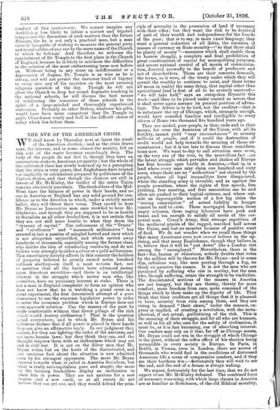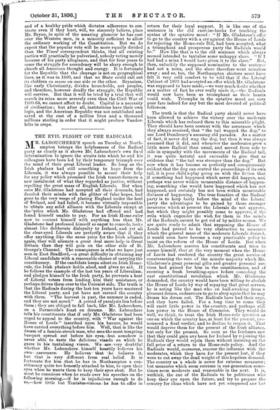THE EVE OF THE AMERICAN CRISIS.
WE shall know by Thursday next at latest the result of the American election ; and as the crisis draws near, the interest, and in some classes the anxiety, felt on this side of the water becomes exceedingly deep. The body of the people do not feel it, though they have an unconscious stake in American prosperity ; but the whole of the cultivated class has slowly wakened up to a perception that the crisis is very grave, that Englishmen have trusted too implicitly to calculations prepared by politicians of the Eastern States, and that though the chances are still in favour of Mr. McKinley, the verdict of the entire Union remains absolutely uncertain. The freeholders of the Mid- West have the balance of power in their hands, and no one in America or England has any solid ground for con- fidence as to the direction in which, under a strictly secret ballot, they will throw their votes. They crowd to hear Mr. Bryan as Lancashire men once crowded to hear Mr. Gladstone, and though they are supposed to be as hostile to Socialism as all other freeholders, it is not certain that they are not still more hostile to what they deem the "tyranny of capital." The callousness of the " Trusts " and " syndicates " and "mammoth millionaires" has aroused at last a passion of mingled hatred and envy which is not altogether unjustified, and which carries away hundreds of thousands, especially among the farmer class, who dislike the idea of repudiating contracts, and do not believe very strongly in either a silver or a gold millennium. This uncertainty directly affects in this country the holders of property believed to greatly exceed seven hundred millions sterling—in itself a most serious fact, not to mention that all the banks have advanced money upon American securities—and there is an intellectual interest in the struggle which moves men who, like ourselves, have no pecuniary interest at stake. There is not a man in England competent to form an opinion who does not know that he is watching a grand crisis in a great experiment, the first determined attempt of a pure democracy to use the supreme legislative power in order to solve the economic problem which in Europe does not even approach solution. Can the masses of the poor be made comfortable without that direct pillage of the rich ,hich would destroy ? That is the question asked everywhere, and to which Mr. Bryan and his followers declare that if all power is placed in their hands they can give an affirmative reply. In our judgment they cannot, for they are fighting the order of the universe, and not mere human laws ; but they think they can, and the thought inspires them with an enthusiasm which may yet ond in civil war. It is not on the Silver men that Mr. Bryan relies, but on the hosts of the discontented, and one ominous fact about the situation is now admitted even by his strongest opponents. The more Mr. Bryan swerves towards what is called in America Socialism, but what is really anti-capitalism pure and simple, the more .lo the farming freeholders display an inclination to place him in power. They are not anxious for a new heaven and a new earth, or at all events do not bellevP they can get one, and they would defend the prin- ciple of severalty in the possession of land if necessary with their rifles ; but they want the rich to be deprived of part of their wealth and independence fOr the benefit of the poor ; that is to say, in more exactlanguage, they want a general reduction of all debts,. the emission of masses of currency on State security—" so that there shall be plenty of money "—measures which shall enable them to borrow cheaply, a complete and final prohibition of great combinations of capital for monopolising purposes, and severe national control of all means of communica- tion, directed avowedly to the benefit of producers and not of shareholders. Those are their concrete demands, the terms, as it were, of the treaty under which they will permit the wealthy to continue to exist, and those terms all mean in reality the same thing, that capital other than agricultural land is first of all to be severely amerced- " we will take half," says an outspoken Bryanite this week—and then to be placed under control so severe that it shall never again assume its present position of advan- tage. The debtor is to be lord, not the creditor—that is in substance the cry of Chicago, which, strangely enough, would have sounded familiar and intelligible to every citizen of Rome two thousand five hundred years ago.
They are misled, poor people, in their ends and in their means, for even the dominion of the Union, with all its fertility, cannot yield "easy circumstances" to seventy millions of people, and if it could the destruction of credit would not help towards the securing of those cir- cumstances; but it is too late to discuss those considera- tions now. We want to-day to call attention once more, on the very eve of the vote, to the marvellous fact inat the latent struggle which pervades and shakes all Europe has first become open battle in America,—that is, in a land where every man may claim one hundred and sixty acres, where there are no " authorities " not elected by the people, where all legal inequalities have disappeared, where the standing army is invisible, and as against the people powerless, where the rights of free speech, free printing, free meeting, and free association can be and often are pushed to their logical extreme, and where out- side an imperceptible section of a few big cities the "strong conscription" of actual liability to hunger cannot be said to exist. These mortgaged farmers, these angry artisans, these raging labourers have pork and beans and tea enough to satisfy all needs of the cor- poreal man. Coxey's Army, that strange repetition of the mediwval armies of the ragged, marched half across the Union, and lost no member because of positive want of food. We do not wonder when we recall these things that many Americans even now cannot believe in the up- rising, and that many Englishmen, though they believe in it, believe that it will be "put down" like a London riot among the "unemployed." Nevertheless, there is the fact—for, beaten or victorious, nobody doubts that votes by the million will be thrown for Mr. Bryan—and in some dim, nebulous way, like men peering through a fog, we think we perceive the reason. It is not the men who are paralysed by suffering who rise in mutiny, but the men who, though suffering, retain the strength to be vindictive. The discontented sections of the masses in America are not hungry, but they are thirsty, thirsty for more comfort, more freedom from care, more command of the things which to them make up the dignity of life. They think that their creditors get all things that it is pleasant to have, security from ruin among them, and they are rising to demand "their share," under the menace, ex- press or implied, of creating a revolution, with the meta- phorical, if not actual, guillotining of the rich. This is the meaning of their struggle, and for all who are humane, as well as for all who care for the safety of civilisation, it must be, as it is fast becoming, one of absorbing interest. Our readers may rely on it that, far off as Chicago seems, Mr. Bryan could not win in the struggle of which Chicago is the pivot, without the reflex effect of his election being perceptible in every society in Europe. In Paris, in Berlin, in Vienna, even in London, there are scores of thousands who would find in the conditions of distressed American life a scene of comparative comfort, and if they see their brethren win ;—iortunakely they will wait to see the end, and the end of a dream is always waking.
We repeat, fortunately for the last time, that we do not expect to see Mr. McKinley defeated. The combined force of economic reasoning, with which large classes in America are as familiar as Scotchmen, of the old Biblical morality, and of a healthy pride which dictates adherence to con- tracts even if they hurt, will, we sincerely believe, place Mr. Bryan, in spite of the amazing glamour he has cast over the Western men, in a minority sufficient to allow the ordinary working of the Constitution. But we do expect that the popular vote will be more equally divided than the Times' correspondent thinks, that all existing parties will practically be pulverised, nobody voting merely because of his party allegiance, and that for four years to come the struggle for ascendency will be sharp enough to absorb all American thought and energy. It is fortunate for the Republic that the cleavage is not on geographical lines, as it was in 1860, and that no State could call out its children en masse on one side or the other. Bryanism, like early Christianity, divides households, not peoples, and therefore, however deadly the struggle, the Republic will survive. But that it will be tried by a trial that will search its reins more severely even than the Civil War of 1860-64, we cannot affect to doubt. Capital is a necessity of civilisation ; but after all, institutions have their own logic, and the American Republic was not established and saved at the cost of a million lives and a thousand millions sterling in order that it might produce Vander- bilts in crops.











































 Previous page
Previous page